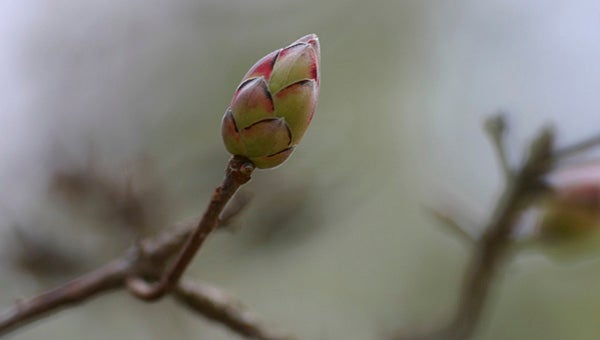Arboretum Paths: A walk through winter landscape
Published 7:00 am Wednesday, January 20, 2016

Pink honeysuckle azalea buds are festooning the shrubs near the entrance to the Pinecote Pavilion. (Photo: Pat Drackett)
Almost two dozen people turned out for last Saturday’s winter botany field walk led by Pearl River County Extension Agent, Dr. Eddie Smith. The group enjoyed a winter stroll through the Arboretum exhibits, and learned tips for identifying trees and other plants by their bark, buds, and other structural characteristics.
This topic reminds me of a humorous story we once heard from a visitor who had been on a botany field walk and observed that one participant was rapidly tearing the leaves off a branch she was trying to identify. When she asked about what this person was doing, she learned they had first learned how to identify trees in a winter botany class. Therefore, she never used the leaves in making an identification!
Learning trees in winter is truly a way to become acquainted with their more subtle qualities. When the familiar leaves are long gone, other aspects will stand out. Currently, many plump flower buds are present on our pink honeysuckle azalea (Rhododendron canescens) shrubs along the walk near the Pinecote Pavilion.
These native azaleas will begin blooming before the leaves fully emerge, making a real show of the emerging flowers. Had the swollen buds on these deciduous shrubs been obscured by leaves, you might never have noticed the striking bud scales, with tips that are painted with a maroon-red tinge.
In winter, the cinnamon-brown buds on American beech (Fagus grandifolia) trees look like tiny pointy cigars. One way to identify this tree in a winter landscape is by the fact they hold their leaves throughout the year, as many oaks also do. This causes them to stand out in the forest understory. Check the backsides of beech leaves – they are delightfully fuzzy, which can be a fun way to introduce children to identifying trees.
If you look closely at the bare trees you pass, you might spot a cocoon of a Polyphemus moth hanging from a twig. Thanks to the Internet, you can quickly find an image of this cocoon so you will know exactly what to look for. American beech is one of the host species of Polyphemus moth caterpillars, so keep your eyes peeled when you pass this tree, as well as oak, maple, pine and hawthorn trees.
Another moth who may be waiting to emerge from a cocoon in the woods is the Promethea moth. One of its host plants is the sweetbay magnolia (Magnolia virginiana), which is common to the Arboretum. Children are particularly fascinated by these large moths, which are both in the Saturniidae family, to which luna moths also belong. Search for an image of these moths, and note the trees to look for that might be providing them with a winter home for their cocoons.
It is interesting that none of these Saturniidae moths have mouthparts, so they do not feed! It is the caterpillars that do the munching. If you have an interest in insects or know a child who is captivated by them, do an image search for the Saturniidae family. I guarantee that it will be a while until you tear yourself away from the screen. Teach a child how to tell the difference between these male and female moths, and why they are different.
Another winter field walk will be offered on Saturday, February 6, at 1:00 p.m. Walk the grounds with Arboretum director Pat Drackett, and experience the subtle natural winter beauty around you. Learn about native plants with winter interest, and ways to incorporate them into your home landscape. Members free; non-members $5. Call the Arboretum office at (601) 799-2311 to sign up.
Attend our eighth annual Forge Day event from 10:00 a.m. to 2:00 p.m. on Saturday, January 30. See blacksmithing and metalworking demonstrations by area craftsmen. Bring your kitchen knives for sharpening, and browse handcrafted items for sale. Free for Arboretum members, $5 for non-members, and $2 for non-members’ children. No registration required.
The Arbor Day Native Plant Sale will be held on Saturday, February 13, from 1:00 a.m. to 3 p.m. Admission is free this day, so come check us out! The Arboretum is open Wednesday through Sunday from 9 a.m. to 5 p.m. and located in Picayune, off I-59 Exit 4, at 370 Ridge Road (south of Walmart and adjacent to I-59).
By Patricia Drackett





